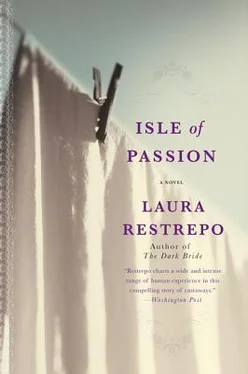Alicia was bedazzled by the thousands of lit candles, by the tiny flames that multiplied in the reflection on the gold leaf that covered the carved cedar of the altars. She felt overwhelmed by the quantity of flowers. The saints, niches, naves, corners, both sides of the aisles, the pulpit: the whole church was bursting with blooms. They combined in a full range of colors and scents, dominating all the available oxygen inside. She felt asphyxiated and a little dizzy, and, closing her eyes, she slowly let some air into her lungs and tried to focus only on the smells. In spite of the incense, she was able to distinguish floral scents — the sweet jasmines, the slightly acrid daisies, the steamy gardenias, the familiar roses, and the almost imperceptible yet treacherous charm of orchids. The overloaded breath of air wrapped around her and numbed her senses, isolating her from reality.
She opened her eyes, inhaling deeply, and was able, little by little, to focus on the blurred images. Particularly one of them, a stranger who stood stiffly by her side. She looked at him in amazement, as if seeing for the first time his thin mustache, his doll-like eyelashes, his round, introspective eyes, his hair, disciplined with brilliantine and sharply parted in the middle. He, Ramón, the stranger with whom she was to live for the rest of her days, turned to look at her and smiled. Though it came from that strange face, his smile was warm and familiar, and brought Alicia back down to earth.
I know him little, but I love him, Alicia thought, after catching her breath, and she busied herself arranging her tulle veil around her feet. Actually, they had known each other since childhood and had been engaged since adolescence, but during their courtship they never had the opportunity of being alone, of talking freely until they ran out of topics to talk about, of being close, of being in physical contact, of scrutinizing the nooks and crannies of each other’s soul. In the last seven years, Ramón had been away on military duty. Once or twice a year he had been granted a furlough to return to Orizaba, and on those visits, which would last a few days or a few weeks, he alternated between sleeping all his postponed siestas, letting himself be fed and pampered by his mother, and courting his fiancée.
An engagement in Orizaba — a twisted, fearful, and overly pious town, teeming with gossip — consisted of no more than after-dinner family gatherings, bouquets of roses, croquet games, kissing of hands, and walks on the alameda. There is testimony, for instance, that after their engagement was formalized and made public, the two lovers began to stroll arm in arm. This is stated in an unpublished manuscript by a local friend of Alicia’s family, Don Antonio Díaz Meléndez, entitled “Orizaba de mis recuerdos” (The Orizaba I remember).
There is no mention in it, however, of the piles of garbage on the streets where the pigs snooped around, of the dark vestries where priests used to exorcise epileptics by beating them, nor of the street corners, right in the center of town, where the poor used to relieve themselves. But the lost graces of Orizaba do get nostalgic mention: the well-trimmed lawn and shade trees in the alameda, the fountain of playful waters, the aristocratic family gatherings listening to the strains of the Municipal Military Band playing Juventino Rosas’s “Over the Waves” waltz in the gazebo of the central plaza after the eleven o’clock mass. Don Antonio tells how one Sunday in the middle of an open-air concert and the pleasant strolling of the townspeople, he saw a beautiful girl “wearing an elegant hat and a dress with a discreet neckline, reaching down to the tips of her shiny patent leather booties, as the fashion in those days demanded. She was Miss Alicia Rovira, on the arm of a handsome officer, whom she introduced to me as her fiancé. It was Captain Arnaud. This was the first and last time I saw him, and he made an excellent impression on me with his pleasant conversation and loving behavior toward his fiancée, charming Alicia.”
One day, dressed up and serene, they were walking a few steps ahead of her parents, siblings, and cousins when Alicia stopped suddenly and told Ramón, “Besides being in love and getting married, I would like us to be friends, you and me.”
Ramón looked at her in surprise. He kept silent for a while.
“I would like that, too. But that will have to be when we live together, alone. For now, with so many people around us, it’s even difficult to be romantically in love like in the novels.”
The time came to set the wedding date and begin the preparations. Ramón was no longer a decent, pennyless adolescent, nor a dishonored military man labeled as a deserter. Now he had a career and a future — risky and unpredictable, but still promising — to offer his beloved, so he asked for her hand in marriage. On a windy night, accompanied by his mother, Doña Carlota, he arrived at the home of Félix Rovira and his wife, Petra, Alicia’s parents, who served them glasses of sherry and some olives, while Don Félix overdid himself, being gallant and making pretentious jokes. He was courteously pompous when he offered a toast for the future couple. Nobody suspected that his eyes were swollen and his nose red because for hours before the visit, he had locked himself up in the library in a rage and he had cried and had thrown on the floor, tome after tome, most of his Encyclopedia Britannica in an attack of paternal jealousy.
The announcements and the invitations to the wedding were ordered to be printed in an ocher shade. There was a breakfast planned for after the ceremony with French-style hot chocolate, link sausages, the blood pudding that Don Félix, who was from Galicia, prepared himself, and the assorted hors d’oeuvres with Doña Carlota’s famous mayonnaise.
The day had come, and now the wedding ceremony was coming to an end without a hitch, apart from the collectively experienced lack of air. Alicia followed every detail and imprinted them all in her memory, where they would be etched forever: Doña Carlota’s large diamond, which Ramón had set in an engagement ring that reflected tiny rainbows from her little girl’s hand; the weight of the earrings, which matched the ring; the Holy Sacrament of the Communion held on high by the priest’s fat fingers; the nostalgia on her father’s face, which everybody except Alicia simply interpreted as pure emotion; the extremely sharp timbre, practically superhuman, of the solo voice from the choir singing the “Ave María”; Ramón’s beatific smile as he thought of breaking his fast with the sausages and the chocolate. And above all, overpowering everything, the dense, compact scent emanating from the flowers.
At the climax of the ceremony, the final benediction, Alicia looked at the black feathers of her mother-in-law’s outrageous hat. They annoyed her, they seemed to her like a bad omen, and, involuntarily, she made a face. As if he had heard what she was thinking, Ramón bent down toward her and whispered in her ear: “I told my mother not to wear that ugly bird hat because it was going to scare you.”

I COME TO ORIZABA looking for traces of that wedding. It is a small city, dull and graceless. In the Pensión Loyo — where Alicia Arnaud Loyo lives alone since she became a widow — I find one of the marriage announcements, printed in ocher on heavy paper and folded in four. The message is written twice, according to custom.
Mr. Félix Rovira and Mrs. Petra G. Rovira
are pleased to inform you of the forthcoming
marriage of their daughter Alicia
and Mr. Ramón Arnaud
Читать дальше













